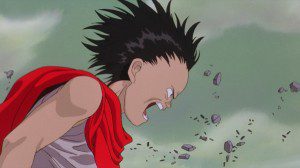Just when you think the saga has ended, something new comes around to re-ignite the debate surrounding a US version of the classic anime. But this time, it’s something new: not another studio signing on to remake the film using western actors and a western setting. No Keanu Reeves as Tetsuo, or the sudden announcement that Chris Columbus is at the helm.
But this time, it’s something new: not another studio signing on to remake the film using western actors and a western setting. No Keanu Reeves as Tetsuo, or the sudden announcement that Chris Columbus is at the helm.
No, this time I’m here to announce that American Akira has already been made. And released. Really? Yep. It’s called “Chronicle,” and it’s been out for a few weeks now.
Don’t believe me? Just type “chronicle akira” into Google and see what pops up. Go ahead, I’m not going anywhere.
…
…
…
See all those links? Interviews and message board discussions? People have already taken notice of this. And the one thing they haven’t really been doing? Bashing it. Seriously, this movie is getting good reviews from all sides. Which is the main reason I went to see it this past week. I was going to skip it, because I was expecting a crappy cam-flick that mixed Cloverfield with Paranormal Activity, but I was sorely mistaken. Chronicle might be one of the tightest, most compelling “documentary” film’s I’ve seen recently.
Which brings me back to the Akira comparison. There are a few elements to two films share in common, aside from the telekinesis and city-devastating battles. Some of them rather obvious, some of them rather subtle. But believe me, they are there. Allow me the chance to recount a few of the more striking ones.
 Andrew is Tetsuo. Yeah, pretty obvious when you look at the two of them. Both are loners. Both are angry. Both inherit a striking amount of power, and feel no guilt in using it. Both succumb to their power by film’s end, and need to be put down in order to stop widespread destruction. The difference? One is an orphan trying to fill the hole in his life with something tangible and emotionally supportive. The other is an abused teenager, seeking to become the apex predator and finally put an end to his torment.
Andrew is Tetsuo. Yeah, pretty obvious when you look at the two of them. Both are loners. Both are angry. Both inherit a striking amount of power, and feel no guilt in using it. Both succumb to their power by film’s end, and need to be put down in order to stop widespread destruction. The difference? One is an orphan trying to fill the hole in his life with something tangible and emotionally supportive. The other is an abused teenager, seeking to become the apex predator and finally put an end to his torment.
- Matt is Kaneda. Also obvious. Kaneda was respected, confident and protective of Tetsuo. He often supplied the voice of “reason,” or at least rationality, when the other “went off the deep end,” and started expressing his rage. And in the end, he had to save Tetsuo from himself. Matt is the confident cousin, the one family member Andrew can rely on. He tries to bring Andrew out of his shell numerous times, and help him make friends. And he is the one who insists they establish rules on using their powers, lest they overreach and kill someone. The difference? Kaneda was a normal kid with a beam weapon. Matt has the same power as Andrew.
- Akira takes place in a dystopian world fraught with stratification, class warfare, decadence and greed. It served as a critique of the economic and political situation in Japan in the late 1980s. Chronicle is set in 21st century America, and released during one of the most polarizing Presidential campaigns in history. Both film work because they reference and exist within the time frame in which they were released. The difference? Neo Tokyo, a manifestation of Japan’s fear of nuclear holocaust and the destruction of Tokyo, rose from the ashes of that same destroyed Tokyo, and represents a world post-nuclear conflict. Chronicle lives in an ongoing global recession.

- Akira is, at its core, the story of the least among us becoming the first. Tetsuo awakens his power, uses it with reckless abandon, rebels against the military and the government, and tries to re-start the universe to fit the emptiness he feels inside (if that’s what you got out of the final scene). Andrew wants revenge against the people who abused him, and takes great joy in being the “apex predator” in his small world. At the same time, he confronts the loss of his mother, and the anger he feels at his father, first by filming his world, then by lashing out against it. The similarity: both eventually devastate a city, and gather national attention from their outburst.
 The main thing to remember here is that Chronicle is not a copy of Akira. Nor is it really an homage either. The borrowed elements within the film are more “flavor” than “story,” and are themselves part of the storytelling method. The situations are different, as are the resolutions. Hell, even the characters are different. The only real thing they share is the theme: a lonely boy becomes powerful, and then uses that power.
The main thing to remember here is that Chronicle is not a copy of Akira. Nor is it really an homage either. The borrowed elements within the film are more “flavor” than “story,” and are themselves part of the storytelling method. The situations are different, as are the resolutions. Hell, even the characters are different. The only real thing they share is the theme: a lonely boy becomes powerful, and then uses that power.
It would be more appropriate, then, to refer to Chronicle as a “spiritual successor” to Akira. It does everything the previous film did, and does it well. It doesn’t cheapen the story, or dilute it in some way. Chronicle is tense, well plotted, extremely believable and authentic by the end. And enjoyable, can’t forget that. It’s very enjoyable.

